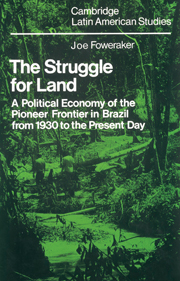 The Struggle for Land
The Struggle for Land Book contents
- Frontmatter
- Contents
- List of maps
- Preface
- Glossary of acronyms and abbreviations used in the text
- Glossary of words and phrases in Portuguese used in the text
- 1 Brazil: political and administrative divisions
- 2 Principal frontier regions
- 3 West Paraná: estates and municipalities
- 4 South Pará
- 5 South Mato Grosso
- Part 1 The pioneer frontier
- Part 2 Political mediation
- Part 3 Accumulation and authoritarianism
- 8 Primitive accumulation and violence on the frontier
- 9 The frontier and the reproduction of authoritarian capitalism
- 10 The frontier and the formation of the Brazilian State
- Bibliography
- Index
- CAMBRIDGE LATIN AMERICAN STUDIES
8 - Primitive accumulation and violence on the frontier
Published online by Cambridge University Press: 29 October 2009
- Frontmatter
- Contents
- List of maps
- Preface
- Glossary of acronyms and abbreviations used in the text
- Glossary of words and phrases in Portuguese used in the text
- 1 Brazil: political and administrative divisions
- 2 Principal frontier regions
- 3 West Paraná: estates and municipalities
- 4 South Pará
- 5 South Mato Grosso
- Part 1 The pioneer frontier
- Part 2 Political mediation
- Part 3 Accumulation and authoritarianism
- 8 Primitive accumulation and violence on the frontier
- 9 The frontier and the reproduction of authoritarian capitalism
- 10 The frontier and the formation of the Brazilian State
- Bibliography
- Index
- CAMBRIDGE LATIN AMERICAN STUDIES
Summary
The process of frontier expansion has been observed to be very violent. Indeed this violence defines the process in some degree. But the explanation for the violence is less evident. It may be seen, in descriptive terms, as equivalent to ‘lawlessness’ and therefore endemic to frontier regions existing beyond the reach of the law: it is random in nature, particular in motive, and criminal in its conception. It may be seen, in more moral terms, as the result of a ruthless search for gain by evil and unprincipled entrepreneurs and politicians, who do not include the costs of violence in their calculations. Finally, it may be seen in political terms, as a result of institutional incursions on the frontier: the legacy of legal confusion and conflict, and of bureaucratic bungling or inertia. Possibly all of these ‘explanations’ contain elements of the truth, but they all participate in partial perspectives of the total process. The intention now is to integrate these different perspectives into a more complete theoretical framework, which will contain not only these descriptive, moral and political elements, but also the economic relationships which underpin violent behaviour on the frontier.
Violence and the stages of frontier expansion
Explanations of the violence as ‘inevitable’ in the ‘lawless’ frontier regions appear to refer to the precarious occupation of the land in the initial stages of frontier expansion.
- Type
- Chapter
- Information
- The Struggle for LandA Political Economy of the Pioneer Frontier in Brazil from 1930 to the Present Day, pp. 169 - 186Publisher: Cambridge University PressPrint publication year: 1981


